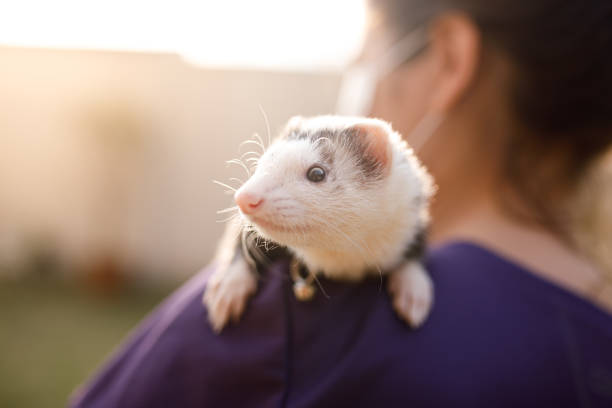What to Consider When Getting an Exotic Pet
Photo session with child and ferret at garden
April 10, 2023
Often, when you hear the term “exotic animal,” you may picture creatures like lions, bats, hippos, skunks, etc. People often aren’t aware of the fact that exotic animals are considerably more common than you might imagine. According to Wikipedia, “Fish, turtles, lizards, ferrets, and parrots” are just a few examples of the various types of exotic pets. You may think of these creatures as typical home pets, but that is not how their classification is determined. A pet considered to be exotic is one that is relatively uncommon or odd to own, or that is typically viewed as a wild species rather than a domesticated pet. The meaning varies by culture, geography, and time; once an animal has established itself sufficiently in the realm of animal fancy, it may no longer be regarded as exotic.
When it comes to overall cost, there are many things to consider, such as how social the animal is, how much mess there might be to clean, life expectancy, and lifestyle compatibility. Pets are obviously a financial commitment and it can be difficult to get an idea of exactly what a new pet will cost. For example, a single ferret might cost $300 to care for in a year in which they are healthy, but ferrets are prone to many chronic and potentially fatal illnesses that can be expensive to treat. When you factor this in, it raises the average annual cost to $600 per year. So ferret owners should expect to spend $300 per year caring for their pet during a healthy year and set aside an additional $300 per year for potential illnesses. So when the question, how much does it cost to own an exotic animal is asked, it really is circumstantial to that specific animal’s needs.
A common question regarding typical, human-friendly exotic animals is, ‘What are the pros and cons?’ To start with the advantages, Animal Fun Facts states that exotic animals “Don’t need a lot of time or attention.” Due to their intimate bonds, dogs and cats require a lot of time and care. You are their companion for life and their owner. As they don’t require your presence, reptiles and similar animals are much simpler to keep. They coexist peacefully on their own.
Secondly, they are suitable for people with allergies. Many people are allergic to animal fur. They are sensitive to animal dander that is associated with bushier pets. As reptiles along with other animals lack hair, there have never been reports of allergic reactions to turtles, geckos, or flower chafers. Finally, most exotic animals are usually harmless. Axolotls, turtles, stick and leaf insects, beetles, and other insects are completely harmless. But for some people, hearing the word “snake” makes their blood chill. Nonetheless, there are far fewer incidents involving non-venomous constricting snakes (such as kingsnakes, king pythons, and corn snakes) than there are involving poorly behaved dogs or irate cats that could pounce on you and slash you in the face.
All of the advantages aside, there are significant cons to owning such animals. One reason is that exotic animals can live for a long time. This is deemed a negative because the cost of keeping up with your animal would increase drastically in comparison to owning a typical household pet like a cat or a dog. This also may not be ideal for children, as they might not understand what they are getting into long term with their animal. Young children are commonly used to their pets being alive for about 3-16 years, but when you own an exotic animal, it could live for up to 30+ years if cared for correctly. For example, Pet Helpful states that “turtles are famous for being slow-moving and so is their aging process. These commonly-kept reptiles can live for a considerable length of time if they are kept properly.” Another con is that some exotic pets are nocturnal. Nocturnal animals can be boring since owners are usually not up all hours of the night to see and play with their pets. If the animal is noisy, they may keep you up at night and affect your sleep schedule.
If you are interested in owning an exotic animal that isn’t from your average pet store and instead from the wild, there are things you should know. Firstly, according to Aza, “Taking them from the wild can endanger their species.” Millions of birds, animals, and reptiles are illegally seized and traded each year due to the immense global demand for these and other exotic pets, most of which perish during capture or transportation. Secondly, you could also get hurt doing this. Many of these wild exotic animals can bite, scratch, and assault owners, kids, or visitors. Animal keepers may be held liable for any harm, disease, or injuries brought on by their charges. It can be challenging, if not impossible, to find new homes for enormous, difficult-to-handle creatures, especially because the majority of zoos are unable to take them. Next, you could very likely end up getting sick. These animals may transmit diseases that are harmful or even lethal to people. Aza also states that, “rabies, distemper, herpes viruses, salmonella, polio, TB… are a few of the illnesses” that can be transmitted to susceptible humans. Furthermore, parasites like intestinal worms and protozoa are also carried by wild animals. Finally, if you were thinking of taking a very uncommonly owned exotic animal from the wild, it would probably be illegal. All of the states in America have different laws regarding what kinds of animals can legally be owned. But taking an animal like a monkey, sugar glider, skunk, lemur, or zebra, is probably illegal.



































































